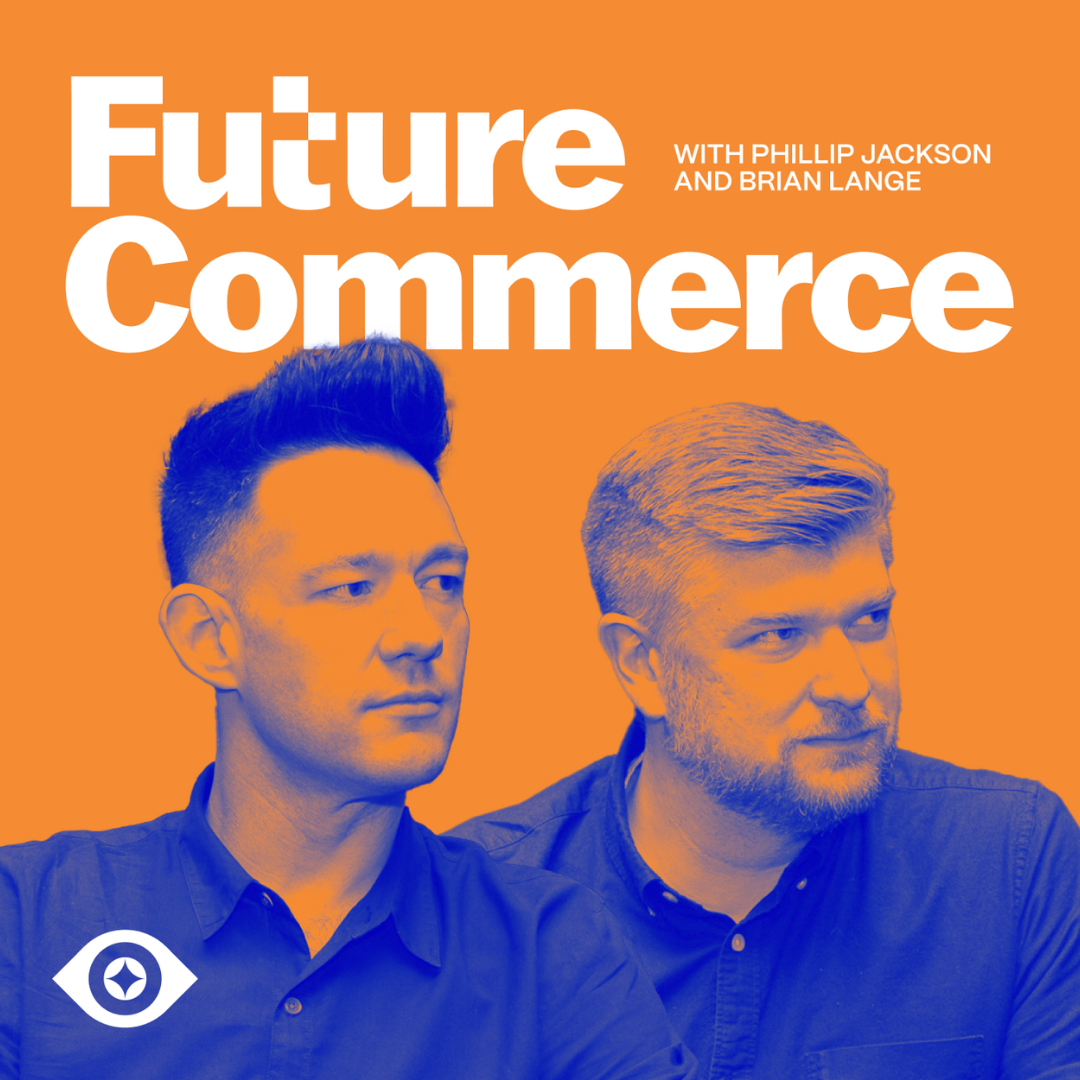Have any questions or comments about the show? Let us know on Futurecommerce.com, or reach out to us on Twitter, Facebook, Instagram, or LinkedIn. We love hearing from our listeners!
Phillip: [00:01:16] Hello and welcome to Future Commerce, the podcast about the next generation of commerce. I'm Phillip. Today, it's a little bit of a different episode. We are going to bring to you a spoken word audio version of one of our most recent Insiders essays, number 127. Before we get there, I just want to say we've got a lot coming up on the docket. As you know, we launched our Visions podcast and we are deep into our content and panel that took place at the Visions Summit back in May. And we are getting deep into a lot of content that I've been wanting to make for a long time. We're covering topics like our brands, a new form of artists, and their products are a canvas... That is an episode called Romanticism. Can't wait for you to hear it. It should be out now on all platforms. We also have a brand new part of our website that is launching, that's bringing every issue of our newsletter, The Senses, online to be searchable. And all it takes is a free sign up to join Future Commerce Insiders and Senses with a Future Commerce account. And by the time you listen to this, it should be up in live. The Senses should be live. And it's our newest section for membership and our newest benefit that we are launching to you, our subscribers. You can get both of those things at FutureCommerce.fm. And while you're there, if you sign up for a Future Commerce account, you'll get on our newsletter mailing list. And that is our third piece of news that's coming out. We have an awesome dinner, a salon event that we're putting on in September. Date TBD. It'll most likely be in the Palm Beach area. And if you're interested in attending, we will be sending out an email in a couple of weeks soliciting for people who may want to join us. There is limited space, I think a max of ten people that may be able to make it. And we are going to be joining forces with our friends at Smarter to put that on. So stay tuned. You can get all of that and more and other episodes of this podcast at FutureCommerce.fm. So without any further ado, today I present insiders number 127 The Uncorkening: Revisiting DTC Groupthink and Brand Criticism, published on July 11, 2022.
Phillip: [00:03:43] My eyes had barely adjusted as I woke up this morning. I saw a tweet and I thought, "Might I still be dreaming?" The Tweet read, "Thinking of Returning My WHOOP Band. Anyone else?" To my surprise, I was not only awake, but there were a handful of likes and nearly a dozen comments. WHOOP, a longtime darling of the DTC space for its quantified self fitness band, requires a pricey monthly membership to own. The band tracks your heart rate data and provides feedback for recovery and sleep tracking. What's surprising about this exchange is how unthinkable it would have been to see it take place just one year ago. Fitness fads come and go, but adherence in the DTC space lavished praise upon praise for this device and the entire experience around it. They joined together to compare recovery information. They discussed the ill effects of alcohol on their sleep. And they jeered at Amazon when they released an Alexa-enabled knockoff for much cheaper. One respondent said, "I'm thinking of selling mine too." Another said, "I'm tired of it telling me that alcohol is bad for me." In my timeline alone, five more threads with similar criticisms for WHOOP began to pop up throughout the day, so I had to wonder to myself have we uncorked a long held frustration with this particular product, with WHOOP, that had been latent all along? Or have we become disenchanted with the narrative in the DTC space overall? What gave people permission on Twitter to air frustrations and why now? Is it concern over the economy? Is it an examination of our spending? Why today? This capitulation seems to come at the end of a series of other market capitulations and sour stomachs. With sentiment around DTC at an all time low, more criticism and critique are beginning to emerge. I call this, "The Uncorkening," a latent criticism that was stymied by the loudest voices in an ecosystem who didn't feel like they had permission to speak up. That has now been unleashed. So in today's piece, we'll examine the three ways that the DTC sentiment is beginning to turn.
Phillip: [00:06:07] The business models, number one, have proven unsuccessful at a critical time in the economy. Number two, the products don't live up to the hype and are overpriced. And number three, the loudest voices have been silenced or moved on. Number one, the DTC business models have been unsuccessful. The direct to consumer or DTC era of eCommerce brought with it some incredible opportunities for enterprising people to pursue their entrepreneurial dreams. It also brought a cult of personality and gatekeeping that bullied people into silence while propping up a portfolio for early-stage investors who are eager to try to build brands for their own benefit. I don't profess to be an expert on eCom or DTC, and I am not a "student" of the DTC space, as many others have professed to be. But it doesn't take an MBA or an academic deep dive to find that the handful of IPO exits have had lackluster results. Of the 12 direct to consumer IPOs tracked by Nate Poulin, only one, Lululemon, has sustained growth in an otherwise bear market in 2022. Even then, Lululemon stock is off some 33% year to date, which is quite bullish considering that Stitch Fix, Allbirds, and Warby Parker are down 80 to 90% off of their IPO prices respectively. The original promise was that direct to consumer, specifically led by eCommerce, would remove middlemen and form a direct connection with the consumer. This led to dogmatic and zealous adherence to a new type of business model that disintermediated the need for a retail store. Now, some ten years later, we see a pure play DTC with physical retail in wholesale and in marketplaces. Quote, "DTC is no longer a strategy or channel. It's a vibe," as told to me by one industry insider on a private phone call. They were referencing the similar brand aesthetic that so many other millennial-focused brands of the 2010s espoused. Meanwhile, eCommerce is nothing but middlemen. The margin erosive nature of the cloud eCommerce platform ecosystem means that operating a retail business, digital or otherwise, is as full of middlemen as it ever was. The "SaaS Tax" is a shorthand that is used by industry insiders to describe how small points of margin are being extracted bit by bit. And those taxes linearly scale with your business' revenue no matter how much you earn. This means that customers pay more for a product purchased via eCommerce than a traditional store-bought brand found at Walmart or Target. The expectation is that the product is more bespoke, of a higher quality, or has some other intangible benefit, such as a community that makes the price of entry worth it. But that promise doesn't seem to be holding true either.
Phillip: [00:09:05] Number two, the products don't live up to the hype. Another factor of The Uncorkening in DTC is that the loudest voices and advocates for DTC have often silenced criticisms by playing a sort of trump card. To critique a small brand is to criticize the founder behind the brand. This kind of attack silence is critics because being anti founder is a no no in DTC circles. These small brands often have just one or two full time team members, if that, and a horde of part time contractors. They've also often positioned their founders as being a public figurehead for the company. Sometimes these founders are underrepresented minorities, which adds taboo for the would-be critic. A clear example is the brand Immi, a small DTC Raman brand founded by "The Kevins." Kevin Lee, a former VC. And Kevin Chanthasiriphan, a former Facebook product manager. The better-for-you ramen was following in the footsteps of other DTC consumer packaged goods brands, which offered a protein-laden lower sodium alternative to store-bought brands. The brand is objectively beautiful and their launch strategy was solid. They seeded product to a number of influencers, and I bought the ramen of my own accord in January of 2021. The nine pack of ramen cost me $61 shipped. When I cooked it, not only did it not look like the pictures, but the noodles were grainy, soggy, and the broth tasted sharp and sour. Not at all like a 99 cent Top Ramen. "I didn't even try the ramen," confessed one of the launch day Immi influencers who I spoke to over Twitter DM. "Dude, it's so gross," he later admitted. When I reached out to one of The Kevins for a refund, they graciously responded and offered a 50% refund. Their team worked on a revised version of the product, version 2.0, which currently has a 2.88 star rating and a bevy of one and two star reviews on think testing, which suggests that they haven't fully solved their formulation issues. A quick search reveals similar criticism on Reddit, where anonymity and the ability to be outspoken is a built-in feature to the platform. On Twitter, however, there are few, if any, critiques. Immi didn't just sour me, pun intended, on eCommerce CPG and pretty looking more expensive brands. It soured me on the model altogether. I was coerced into purchasing a product for 60 times the market rate by a person that I consider to be a friend who was hyping a product that he himself had never tried. When I later criticized Immi on a podcast with a guest familiar with the founders, they asked me to remove my comment from the finished interview due to their status as an angel investor. Meanwhile, the guest also cited knowledge of how unfavorable the reviews had been and didn't like the product themselves.
Phillip: [00:12:10] Point number three: the loudest DTC voices have quieted. As capital outcomes wither for those who had built their reputations. On the examination of the DTC space, the loudest voices have been silenced. Due in part to the great resignation and to the inaccessibility of capital in the current state of the markets many of the most visible DTC acolytes have moved on to new projects or industries. Let's examine a few of them. Chris Cansino, co-founder of Schmitz Naturals, a DTC deodorant brand with a nine figure exit to P&G, is now a full time Web3 proponent. Web Smith, founder of 2 p.m. and former co-founder of DTC men's Shirting brand Mizzen in Main, has been silent on social media since April of 2022. Among other factors, mental health seems to play a large factor for folks exiting the public conversation. Kelly Vaughan, former co-founder of the Taproom and Govalo, stepped back from day to day operations. Kristen LaFrance After leaving Shopify, moved to a SaaS startup repeat as community manager but had been quieter than usual on Twitter up until the time of this writing. Helena Hembrecht-Price went quiet on Twitter in '21, following a separation from Woody, her ex-husband and co-founder of Haus. Even Nate Poulin, an outspoken proponent and 15 year veteran of DTC, sent a stunning tweet, "Wrestling with the reality that the market leading brands built 20 years ago or longer are going to be the market leaders for the next 20." Without these outspoken voices, the space has been eerily silent and the momentum has slowed. As one person explained to me after the time of this writing, they said, 'The priests have left the temple." In conclusion. Here is a quote from The Senses January 27, 2022. I wrote, "We will look back on the disrupter brand DTC era as primarily benefiting the R&D departments of KFC, Target, and Amazon, who have been able to operationalize and capitalize on the new consumer expectations created by venture capitalists." From The Senses.
Phillip: [00:14:29] To Nate Poulin's point, the incumbents will succeed in the wake of a DTC failure. Disruption theory states that when an entrant tackles incumbent competitors head-on, offering better products or services, the incumbents will accelerate their innovations to defend their business. This has proven true on all accounts. What's more concerning for DTC is that we are at the beginning of a long market cycle which may cause us to cut spending. As concerns about the economy grow, people are going to reexamine their spending. And if they don't feel intrinsically connected to a product or to the person who is selling it, they have fewer reasons than ever to buy it direct. A form of brand romanticism seems to be dying. From our 2022 Visions report, we found that 42% of consumers buy from products to support the brand despite not liking or desiring the product directly. This kind of behavior will subside as consumers refocus their spending on essentials away from Expendables. My own experience with The Uncorkening is that until today, I had feared repercussions on publicly sharing my own firsthand experiences with many DTC brands that fail to live up to their promise. Nik Sharma, a revered and well-connected proponent of DTC, is closely tied to the Immi project. As many capital allocators and angel investors are connected. My critique would likely have been casting a pall over Future Commerce as a whole or labeled me as anti founder, or worse, critiquing one of the few pairs of underrepresented minority founders with venture backing in our space when we should be praising and celebrating successes like Kevin and Kevin have had in getting the project funded and launched, not deriding them instead. So rather than speak out, I said nothing. But on a dime, the environment has changed and we're waking up to the reality that the DTC era may have come to an end if not been put on pause. When I woke up this morning, I was already convinced that I could live without bougie ramen. Tonight, when I go to sleep, I'm convinced that I do not need a $30 a month WHOOP band. What will The Uncorkening make me not want to buy next? For Future Commerce. I'm Phillip. Thank you so much for listening.
Phillip: [00:16:58] You can find more episodes of our podcast, including longer-form episodes with many guests and amazing people, including those in the direct to consumer space. You can get it all at FutureCommerce.fm, including our newsletter. And if you want more of our research, including our most recent research piece, Visions, you can get it at Visions.Report. Thank you so much for listening to this episode of Future Commerce. We believe that commerce is a catalyst for change in whose world? Your world. The world around you. And maybe one day, the world. Thank you so much.



